
Too young, too soon
By Aaren Abigail, March 5 2020—
Two decades ago, the deaths of actors and musicians wouldn’t be something we would mourn. Rather, it would be something we would express our sentiments about — a point of conversation between acquaintances. Today however, our heavily-desensitized society has cultivated a culture where public figures and celebrities have become part of our daily routine. We see public figures and celebrities everywhere, ranging from the cover of a magazine, your Instagram timeline, your ‘Tik Tok for you page,’ your favorite TV show on Netflix and on a loop on your Spotify.
Most of the time, celebrities grow up with us. We could all remember and reminisce about that time where we would jam out to Vanessa Hudgens and Zac Efron in High School Musical, or the time we would laugh out loud to Ariana Grande’s stupid jokes on Victorious, or how we would be amazed by the mischievous and irresponsible Cameron Boyce in Jessie. Many of the most vivid role models of our adolescence were celebrities. Even though we didn’t personally know them in real life, they were a significant chunk of our childhood memories. Many would go so far as to say that this almost makes them a part of their family, which was why the news that Cameron Boyce died at the tender age of 20 years old shook the entire Internet. This is because, subconsciously, we connect the deaths of these entertainers to something dearer and closer to our hearts — the idea of losing a friend or a parent.
Aside from the footprint they’ve left in their own respective fields of career, these celebrities we put on such a high pedestal are humans too. They have flaws, insecurities and troubles of their own. Demi Lovato for instance, opened up about her struggle with alcoholism and expressed that into one of her songs, “Sober.” Kelly Clarkson too, wrote “Piece by Piece” about the absence of a father figure in her life. This is heavily influential in our troubled society, where today’s youth have their own demons they grapple with, such as confusion about their identities, feeling like they have no place in the world and that they’re alone and that no one will be there for them when they fall. These are the times where celebrities become more than just a figure who we look up to and admire — this is when they create somewhat of a safe space for us to just be ourselves. At the end of the day, we find comfort in knowing that someone has fought the same demons that have come to haunt us, and they came out of their struggles stronger than before. We realize that we’re really not alone.
With the recent news of Kobe Bryant and his 13-year-old daughter, Gianna Bryant’s passing, we take a moment to look at what he’s done in his life that makes us mourn his loss. Bryant made a difference beyond just his phenomenal career in basketball. He may no longer be able to grace us with his presence in a No. 24 Lakers jersey, but his work on and off the court will be forever remembered. The Vivo Foundation which he started in 2002 promotes education for young children and students who seek financial aid. Whether you’re a Lakers’ fan or not, it is hard not to respect the passion Bryant brought with his social platform. On the court, he was a phenomenal basketball player, a fierce competitor and a passionate team leader. Off the court, he was a wonderful father, husband and a role model for people, even to those who have never held a basketball in their lives.
Most of the time, when we hear about the death of a celebrity, what we see isn’t the end of a successful career, it’s the reminder how fragile a human life can be. It’s the end of a life of someone we formed a seemingly intimate connection with, one that transcends just knowing them in real life.
This article is part of our Opinions section and does not necessarily reflect the views of the Gauntlet’s editorial board.
